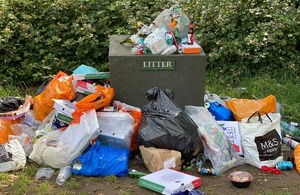
There has been widespread coverage by the Sun, the Daily Mail, the Daily Express and Times Radio following our announcement that on-the spot fines for litter, graffiti and fly-tipping will rise as part of a crackdown on anti-social behaviour.
To help strengthen councils in their fight against waste crime, government is laying a statutory instrument increasing the upper limits for various fixed penalty notices (FPNs) on Monday 10 July. This means:
- The maximum amount those caught fly-tipping could be fined will increase from £400 to £1,000
- The maximum amount those who litter or graffiti could be fined will increase from £150 to £500
- The maximum amount those who breach their household waste duty of care could be fined will increase from £400 to £600
Environment Secretary, Thérèse Coffey said:
Everyone loathes litter louts and people who dump rubbish. We are increasing the penalties local councils can apply for this behaviour that spoils our streets and harms nature.
Environment Minister Rebecca Pow said:
We’re taking action right across government to crack down on anti-social behaviour and ensure waste criminals face justice – but it’s vital that communities have the tools they need to address the problem as well.
That’s why we are supporting local authorities by increasing the upper limit for on-the-spot fines and ringfencing the proceeds for clean-up and enforcement operations.
In addition to increasing the upper limit on fines, the government has launched a consultation on ringfencing the receipts from FPNs for litter and fly-tipping to fund local authorities’ enforcement and clean-up activities, such as spending the money raised from fining criminals on further enforcement officers. This would see the money paid by criminals go directly back into repairing the damage from their crimes, or into enforcement efforts to prevent similar incidents from happening again.
The higher fines to crack down on littering and fly tipping comes alongside Defra’s wider work to tackle waste crime and take the fight to offenders.
In April, grants totalling £775,000 will help councils roll out a range of projects to crack down on fly-tipping were announced. Twenty-one local authorities will benefit from the grants, with schemes including roadside CCTV and social media campaigns in Plymouth and targeted surveillance at hotspot areas in Pendle.
Defra has also announced that fees for disposing of household DIY waste at recycling centres will be abolished – helping people to deal with their waste responsibly and removing a financial burden that gets in the way of people dealing with their waste responsibly.
3 comments
Comment by Roy Harris posted on
The maximum fines set in legislation for fly tipping and household waste duty of care offences are unlimited fines. Fly tipping is also imprisonable. The maximum fine for litter and fly posting is level 4, so that remains capped at £2,500. This article is wrong and suggests the Government are reducing fines and trivialising the offences. Payment of a fixed penalty is voluntary. Waste data flow statistics suggest only 14% are paid.
Comment by David Rounding posted on
Court fines / costs awards must rise as and when fixed penalties rise or there will be increased incentive for offenders to 'take their chance at court' rather than paying the FPN.
In Buckinghamshire the average 'total to pay' (fines + costs etc) for fly-tipping related offences on court conviction is less than £2,000.
In order to maintain the same ratio, that needs to increase to £4,500 -£5,000
Comment by Sharon Jennings posted on
This is great but is it going far enough? Neighbours of ours have just returned from Slovenia where the fine's are very high £4000.00 for littering. This is working well as they said the country is litter free.
What is being done to remove the existing roadside litter? My council, Ceredigion C. C. say they have no funds to clear the roadsides and it is getting worse everyday. Perhaps councils can be allocated funds for this purpose.
Kind Regards,